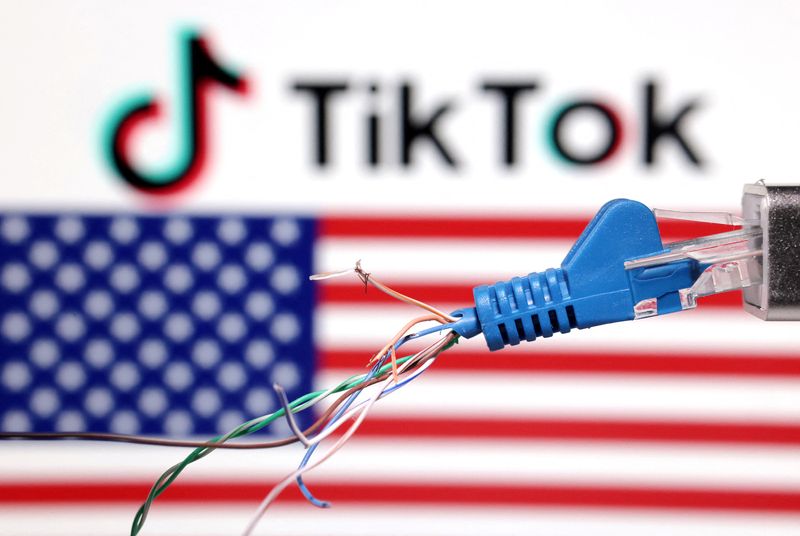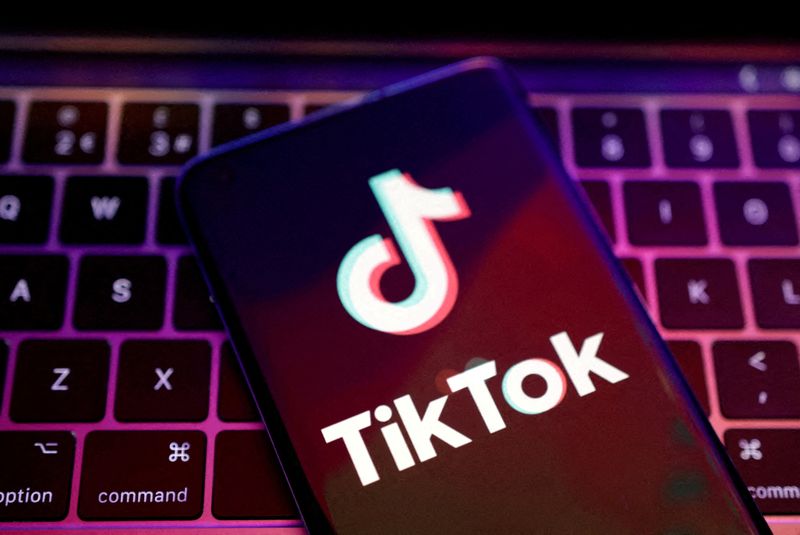By David Shepardson
WASHINGTON (Reuters) - The U.S. Senate voted by a wide margin late Tuesday in favor of legislation that would ban TikTok in the United States if its owner, the Chinese tech firm ByteDance, fails to divest the popular short video app over the next nine months to a year.
Driven by widespread worries among U.S. lawmakers that China could access Americans' data or surveil them with the app, the bill was passed by the U.S. House of Representatives on Saturday and U.S. President Joe Biden has said he will sign it into law on Wednesday.
"For years we've allowed the Chinese Communist party to control one of the most popular apps in America that was dangerously shortsighted," said Senator Marco Rubio, the top Republican on the Intelligence Committee. "A new law is going to require its Chinese owner to sell the app. This is a good move for America."
Asked about the Senate's vote, the Chinese foreign ministry referred on Wednesday to comments the ministry made in March when the House of Representatives passed a similar bill.
At the time, the ministry criticized the legislation, arguing "though the U.S. has never found any evidence of TikTok posing a threat to the U.S.'s national security, it has never stopped going after TikTok."
The four-year battle over TikTok, which is used by 170 million people in the United States, is just one front in a war over the internet and technology between Washington and Beijing. Last week, Apple (NASDAQ:AAPL) said Beijing had ordered it to remove Meta Platforms (NASDAQ:META)' WhatsApp and Threads from its App Store in China over Chinese national security concerns.
TikTok is set to challenge the bill on First Amendment grounds and TikTok users are also expected to again take legal action. A U.S. judge in Montana in November blocked a state ban on TikTok, citing free speech grounds.
The American Civil Liberties Union said banning or requiring divestiture of TikTok would "set an alarming global precedent for excessive government control over social media platforms. ...If the United States now bans a foreign-owned platform, that will invite copycat measures by other countries."
TikTok, which says it has not shared and would not share U.S. user data with the Chinese government, did not immediately comment but has told employees it would quickly go to court to try to block the legislation.
"This is the beginning, not the end of this long process," TikTok told staff on Saturday in an email seen by Reuters.
The Senate voted 79 to 18 in favor of the bill, which was attached to a measure to provide $95 billion in mostly military aid for Ukraine, Israel and Taiwan. The TikTok divestment directive won fast-track approval after being introduced just weeks ago.
In 2020, then-President Donald Trump was blocked by the courts in his bid to block TikTok and Chinese-owned WeChat, a unit of Tencent, in the United States.
However, the new legislation is likely to give the Biden administration a stronger legal footing to ban TikTok if ByteDance fails to divest the app, experts say.
If ByteDance failed to divest TikTok, app stores operated by Apple, Alphabet (NASDAQ:GOOGL)'s Google and others could not legally offer TikTok or provide web hosting services to ByteDance-controlled applications or TikTok's website.
The bill would also give the White House new tools to ban or force the sale of other foreign-owned apps it deems to be security threats.
Democratic Senator Ron Wyden said he was concerned the bill "provides broad authority that could be abused by a future administration to violate Americans’ First Amendment rights."
Once the bill is signed into law, ByteDance will have 270 days to divest TikTok's U.S. operations with a possible three-month extension if there are signs a deal is progressing.
Democratic Senator Ed Markey said it would be hard, if not impossible, for ByteDance to divest by early 2025, adding that a sale would be one of the most complicated and expensive transactions in history, requiring months if not years of due diligence.

"We should be very clear about the likely outcome of this law. It's really just a TikTok ban," he said. "Censorship is not who we are as a people. We should not downplay or deny this trade-off."
The bill could also be an issue in the November presidential campaign, with Republican presidential candidate Trump urging young voters to consider a possible TikTok ban.
